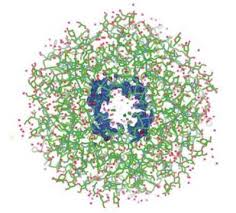Researchers have found that cholera toxin activates a key molecule more strongly in people with the O blood type, putting them at increased risk of getting more severely ill from the disease than people of other blood types.
Cholera toxin hyperactivates a key signaling molecule in intestinal cells of people with the most common blood type and high levels of that signaling molecule lead to excretion of electrolytes and water -- in other words, diarrohea, the researchers found.
Cholera is marked by severe diarrohea that can lead to dehydration, shock and even death.
"We have shown that blood type influences how strongly cholera toxin activates intestinal cells, leading to diarrohea," said the study's senior author James Fleckenstein, Associate Professor at Washington University School of Medicine in St. Louis.
Cholera sickens three million to five million people around the world every year, leading to 100,000 to 120,000 deaths, many of them in the Indian subcontinent, where cholera has been endemic for centuries.
The disease is caused by Vibrio cholerae, a bacterium that infects cells of the small intestine.
Epidemiologists first noticed four decades ago that people with blood type O were more likely to be hospitalised for cholera than people of other blood types, but the reasons for the difference had never been determined.
Although the blood group antigens - A, B, AB and O - are best known for their presence on red blood cells, they also are found on the surface of many other cell types, including the cells that line the intestine.
To find out what effect cholera toxin had on intestinal cells carrying different blood group antigens, the researchers used clusters of intestinal epithelial stem cells, called enteroids, that can be grown in the lab and differentiated into mature intestinal cells.
As part of the study, the researchers treated four groups of enteroids with cholera toxin -- two derived from people with blood type A and two from people with blood type O -- and measured the amount of a key signaling molecule inside the cells.
The researchers found that levels of the signalling molecule were roughly twice as high in the cells with the type O antigen than in the cells with type A antigen, suggesting that people with type O antigen who were exposed to cholera toxin would suffer more severe diarrohea.
The findings appeared online in The American Journal of Tropical Medicine and Hygiene.
(With agency input)
